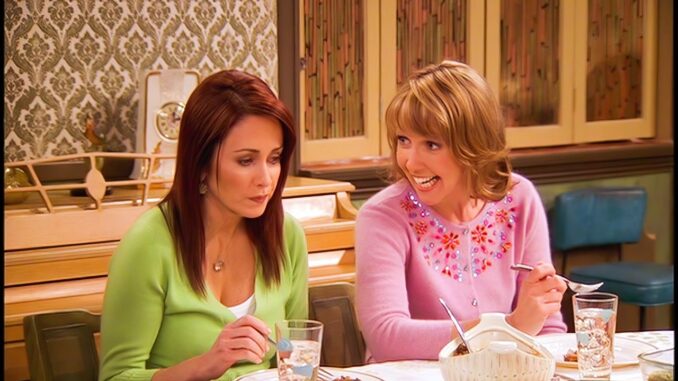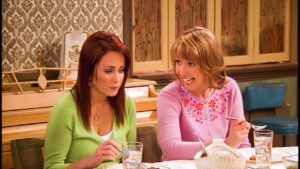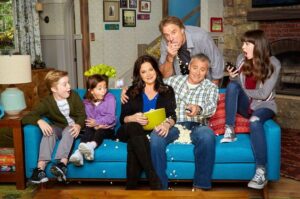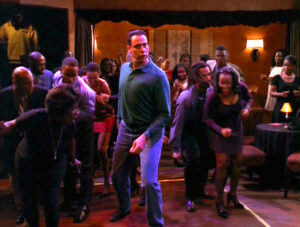
Most people watch “Everyone Loves Raymond” and smile. As I binged the beloved sitcom in anticipation of its 25th anniversary on Sept. 13, I cried.

Over the course of nine seasons, studio audiences laughed, while I watched the patterns of my highly dysfunctional family being played out scene by scene.
In one episode, Ray Barone (Ray Romano) and his brother Robert (Brad Garrett) argue in the back of a car on their way to play golf. The grown men punch, push and hurl insults like children.
“It’s like you said: Mom loves me more,” Ray says.
“She can love you all you want because I love her more than you do,” Robert retorts. “You take her for granted. I cherish every ounce of affection that woman gives me because I have to fight for it like a dirty dog on the street.”
Well said, Robert, I thought, as tears welled, watching the essence of my upbringing play out onscreen.
All parents have a favorite child, Psychologist Ellen Weber Libby, author of “The Favorite Child: How A Favorite Impacts Families for Life,” argues, because they are human, and humans have preferences. Parents may love their children equally, but when children perceive consistent unbalanced treatment, heightened sibling rivalry and emotional damage often follow. Libby says favored children often feel entitled and later struggle as adults because they no longer feel special. A non-favored child can suffer low self-esteem and experience depression. I certainly have.

For most of my life, as I watched my parents shower my brother with love and favor, I asked myself, “Why aren’t I good enough? How come my parents love me less?”
Want a daily wrap-up of all the news and commentary Salon has to offer? Subscribe to our morning newsletter, Crash Course.
Like Robert, I was labeled the black sheep of the family. Ray and my brother were granted golden boy status. As a result, Robert and I were stuck in the quagmire that is sibling rivalry, always striving to earn parental love and attention.
Sportswriter Ray lives with his wife Debra (Patricia Heaton) and their three children across the street from his parents. Unmarried, Robert still lives with his parents. In one episode, Ray and Robert argue because Robert was promoted to police lieutenant, while a publisher turned down Ray’s book. They slug it out on their parents’ plastic-covered sofa and rug, making a huge mess.
Afterward, they nurse the wounds on their middle-aged bodies. Ray says, “We have to stop this. Debra’s right. This competition, it’s stupid. And your feet stink.”
“Why are we like this? Where does this come from?” Robert asks.
On cue, their mother Marie (Doris Roberts) walks in with a broom and duster to sweep up the broken lamp and other debris. Recognizing the irony, the studio audience laughs.
Sadly, the emotional fallout from parental favoritism isn’t easily swept away, nor is it funny to me. A child conferred non-favored status notices every slight — real or perceived. I did.

Growing up in suburban Detroit in the 1960s and 1970s, my brother and I would eagerly wait on the floor of our green-carpeted family room for our dad to return from a business trip. He would produce a model airplane or a miniature Eiffel Tower for my brother. From dozens of business trips over the years, he gave me one gift: a cloisonné Japanese compact, an odd gift for a 10-year-old. My mother quickly absconded with it, declaring it a perfect regift. It became clear to me later that the compact was a token my father received from a Japanese businessperson. It was painful to realize he had not chosen it for me.
For as long as I lived at home, I would smile and greet my father expectantly at the door when he came home, just like a dog. I hoped he would ask me how my day went, simply acknowledge my existence. He rarely gave me so much as a smile.
There are many photos of my father and brother smiling together. In some, my brother wears a cowboy outfit or space suit, costumes that were purchased especially for the photos. In others, our dad cradles my brother in his arms, their faces inches apart as they gaze at a star atop a Christmas tree. I took many of these photos. In later years, my brother would invite me to be in the photos. Not a single Christmas photo exists of my father and me alone.
